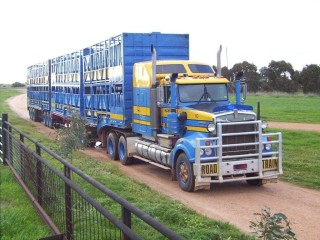
Hampton Transport Services started in 1977 on Hampton Hill Station, a sheep station owned by the Jones family near Kalgoorlie-Boulder in Western Australia.
Bart “Boss” Jones Sr co-founded Hampton Transport Services with his brothers during a tough drought to carry the family and their neighbour’s sheep in order to help the station survive.
The company’s first truck was a Scania 111 painted in blue and yellow national colours of Sweden, matching the nationality of the prime-mover, a livery that is now well-known in the transport industry Australia wide.
Boss Jones was an active director of the company until his passing in 2006. In 2011 he was post-humously inducted into the National Road Transport Hall of Fame. His accompanying profile recognises the pioneering role he played in adopting new technology to improve the remote livestock transporting industry, from introducing two-way radios in his station vehicles and trucks in the late 70s to satellite phones and GPS tracking at the earliest opportunity.
The acquisition of Katanning Livestock (now Hampton Livestock Transport) in 1993 and Road Trains of Australia (RTA) in 2006, and the creation of Hampton Mining and Civil Services in 2003, saw the company become one of the largest privately owned transport and mining services companies in WA.
The combined group now has over 150 prime-movers plus ancillary equipment, and whilst the Hampton head office remains in Kalgoorlie-Boulder, offices are maintained in Perth, Geraldton, Broome, Darwin, Katherine, Mt Isa, Quilpie and Longreach.
The Company is still totally family owned and is now managed by Boss’ two sons, Bart jr and David, with Boss’ wife Nellie and two daughters running the administration side.
Hampton Livestock Transport today operates a fleet of 20 prime movers from depots at Bullsbrook north of Perth and at Geraldton.
Its operations are focused mainly in southern WA but the company also sends road trains to the Kimberley and Upper Pilbara throughout the year to support its sister company RTA as required and also handles occasional lifts to and from the Eastern States.
The company’s work is split roughly evenly between sheep and cattle transport, spanning jobs servicing servicing the live export trade; southern WA processing clients including Western Meat Processors, Harvey Beef, V&V Walsh and Fletcher international, and pastoral companies and single-operator stations and properties.
With live export-related work traditionally accounting for more than half of the company’s annual operations, Hampton Livestock Transport like other transporters was heavily impacted by the June 2011 export suspension and subsequent trade downturn.
As part of a larger diversified company Hamptons Livestock Transport was able to redirect some of its prime movers into other parts of the broader Hamptons Group during the downturn, which saw the number of boats out of Geraldton drop from more than 30 in a year to less than six.
It has taken more than two years for the wheel to turn but Mr Morrissey said the recent boost in import permits to Indonesia had clearly lifted the tempo of cattle movements into the trade in recent months and returned some much-needed confidence again.
Keeping a fleet of 20 prime movers on time and supplied with the right combination of trailers needed to remain optimally utilised at all times is one of the key daily challenges of Mr Morrisey’s job.
At any given time he has at least one eye on a computer screen tracking every unit’s precise GPS location while coordinating jobs ranging from deliveries of slaughter cattle from the Kimberley to southern abattoirs to orders at short notice to transport thousands of sheep and cattle to a port for an export order.
“Time is critical when you’re moving cattle, you want to make sure your trucks are arriving at the right time to keep things flowing and to reduce your transit times,” said Mr Morrissey, who managed cattle exports for Wellard Rural Exports for five years before joining Hamptons three years ago.
“Keeping track of fatigue management, making sure our drivers have their breaks and days off, scheduling trucks, trying to find the next load and where your truck is going to end up so you can minimise your dead running is avery important.
“The name of the game in this business is to try and increase loaded percentage kilometres. For example, if you’re running at 50pc loaded, you want to try and get up to 60-65pc.”
In 2007, the Hampton Transport Group marked 30 years of existence with a celebration at the Hampton Hill shearing shed, where the company began in 1977.
The occasion also celebrated 100 years since the Jones family settled on Hampton Hill Station, which is still operated by family members.

Hampton Livestock Transport
Manager: Justin Morrissey
588 Edward Road
Narngulu WA 6532
PO BOX 264
Geraldton WA 6531
M – 0400 240 424
P – 08 9923 3333
F – 08 9923 3633
Email: justin@hamptonlivestock.com.au
